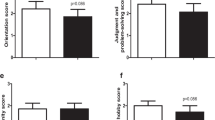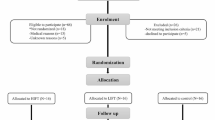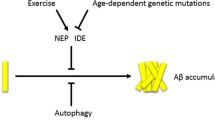Abstract
Objective
In this study, it was aimed to examine the effect of 8-week exercise in Alzheimer’s disease (AD) aged 65 and over through functional, cognitive, and biochemical parameters and irisin metabolism.
Methods
Two groups consisting of healthy individuals and diagnosed with Alzheimer’s over the age of 65 were followed up with a combined exercise program of 45–60 min, 3 days a week, for 8 weeks. At the end of the exercise period, various cognitive and functional tests were performed on the participants, and blood samples were taken for biochemical parameters and irisin level measurements.
Results
In functional evaluations, while there was no difference in pre-exercise measurements of timed performance and quadriceps femoris muscle strength, there was a difference between groups in all other measurements (p < 0.05). Nutritional status increased significantly after exercise in AD individuals. Although there was an increase in mental score values after exercise, it was not statistically significant. Similar to the elderly with Alzheimer’s, the improvements in functional tests in the healthy also led to improvements in activities of daily living and auxiliary activities of daily living. The exercise training did not have an effect on the lipid profile in AD patients, but showed an effect on glycemia and irisin levels (p < 0.05).
Conclusion
Changes in functional, cognitive, and biochemical parameters after the exercise program improved quality of life in Alzheimer’s patients.

Similar content being viewed by others
Data availability
The datasets generated during and/or analyzed during the current study are available from the corresponding author on reasonable request.
References
Copeland JL, Good J, Dogra S (2019) Strength training is associated with better functional fitness and perceived healthy aging among physically active older adults: a cross-sectional analysis of the Canadian Longitudinal Study on Aging. Aging Clin Exp Res 31:1257–1263. https://doi.org/10.1007/s40520-018-1079-6
World Health Organization (2015) World report on ageing and health. World Health Organization, Geneva
Livingston G, Sommerlad A, Orgeta V et al (2017) Dementia prevention, intervention, and care. The Lancet 390:2673–2734. https://doi.org/10.1016/S0140-6736(17)31363-6
Tyndall AV, Clark CM, Anderson TJ et al (2018) Protective effects of exercise on cognition and brain health in older adults. Exerc Sport Sci Rev 46:215–223. https://doi.org/10.1249/JES.0000000000000161
Boström P, Wu J, Jedrychowski MP et al (2012) A PGC1-[agr]-dependent myokin ethatdrives brown-fat-like development of white fat and thermogenesis. Nature 48:463–468. https://doi.org/10.1038/nature10777
Huh J, Dincer F, Mesfum E et al (2014) Irisin stimulates muscle growth-related genes and regulates adipocyte differentiation and metabolism in humans. Int J Obes 38:1538–1544. https://doi.org/10.1038/ijo.2014.42
Sezgin G, Kar F, Uslu S (2022) The effect of nutrition and exercise training on irisin and semaphorin-3E levels in obese patients. Arch Physiol Biochem 128(2):558–567. https://doi.org/10.1080/13813455.2020.1779310
Sontakova L, Bartova A, Dadova K et al (2020) Effects of physical exercise on cognitively impaired older adults: a systematic review and meta-analysis of randomized control trials. Res Square. https://doi.org/10.21203/rs.3.rs-15634/v3
Hamer M, Chida Y (2009) Physical activity and risk of neurodegenerative disease: a systematic review of prospective evidence. Psychol Med 39:3–11. https://doi.org/10.1017/S0033291708003681
Shoukry A, Shalaby SM, El-Arabi BS et al (2016) Circulating serum irisin levels in obesity and type 2 diabetes mellitus. IUBMB Life 68:544–556. https://doi.org/10.1002/iub.1511
Podsiadlo D, Richardson S (1991) The timed “Up & Go”: a test of basic functional mobility for frail elderly persons. J Am Geriatr Soc 39:142–148. https://doi.org/10.1111/j.1532-5415.1991.tb01616.x
Shubert TE, Schrodt LA, Mercer VS et al (2006) Arescores on balance screening tests associated with mobility in older adults? Journal of Geriatric Physical Therapy 29:33–39
Mahoney LR (1965) Reactions of peroxy radicals with polynuclear aromatic compounds. II. Anthracene in chlorobenzene. J Am Chem Soc 87:1089–1096. https://doi.org/10.1021/ja01083a027
Saka B, Kaya O, Ozturk GB et al (2010) Malnutrition in the elderly and its relationship with other geriatric syndromes. Clin Nutr 29:745–748. https://doi.org/10.1016/j.clnu.2010.04.006
Güngen C, Ertan T, Eker E et al (2002) Standardize Mini Mental Test’in Türk toplumunda hafif demans tanısında geçerlik ve güvenilirliği. Turk Psikiyatri Derg 13:273–281
Zheng G, Xia R, Zhou W et al (2016) Aerobic exercise ameliorates cognitive function in older adults with mild cognitive impairment: a systematic review and meta-analysis of randomised controlled trials. Br J Sports Med 50:1443–1450. https://doi.org/10.1136/bjsports-2015-095699
Schultz SA, Boots EA, Almeida RP et al (2015) Cardiorespiratory fitness attenuates the influence of amyloid on cognition. J Int Neuropsychol Soc 21:841–850. https://doi.org/10.1017/S1355617715000843
Colcombe S, Kramer AF (2003) Fitness effects on the cognitive function of older adults: a meta-analytic study. Psychol Sci 14:125–130. https://doi.org/10.1111/1467-9280.t01-1-01430
Venturelli M, Scarsini R, Schena F (2011) Six-month walking program changes cognitive and ADL performance in patients with Alzheimer. Am J Alzheimer’s Dis Other Dement ® 26:381–388. https://doi.org/10.1177/1533317511418956
Bossers WJ, van der Woude LH, Boersma F et al (2015) A 9-week aerobic and strength training program improves cognitive and motor function in patients with dementia: a randomized, controlled trial. Am J Geriatr Psychiatry 23:1106–1116. https://doi.org/10.1016/j.jagp.2014.12.191
Alsubaie SF, Alkathiry AA, Abdelbasset WK et al (2020) The physical activity type most related to cognitive function and quality of life. Biomed Res Int. https://doi.org/10.1155/2020/8856284
Olde MG, Verhey FR, Sijben JW et al (2014) Differences in nutritional status between very mild Alzheimer’s disease patients and healthy controls. J Alzheimers Dis 41:261–271. https://doi.org/10.3233/JAD-131892
Jensen CS, Musaeus CS, Frikke-Schmidt R et al (2020) Physical exercise may ıncrease plasma concentration of high-density lipoprotein-cholesterol in patients with Alzheimer’s disease. Front Neurosci 14:532. https://doi.org/10.3389/fnins.2020.00532
Panza F, D’Introno A, Colacicco AM et al (2006) Lipid metabolism in cognitive decline and dementia. Brain Res Rev 51:275–292. https://doi.org/10.1016/j.brainresrev.2005.11.007
Ramirez A, Wolfsgruber S, Lange C et al (2015) Elevated HbA1c is associated with increased risk of incident dementia in primary care patients. Journal of Alzheimer’s Disease 44:1203–1212. https://doi.org/10.3233/JAD-141521
Binder J, Marczak A, Adler G (2017) Glycilated hemoglobin and cognitive impairment. Int J Neurol Neurother 4:069. https://doi.org/10.23937/2378-3001/1410069
Tanisawa K, Taniguchi H, Sun X et al (2014) Common single nucleotide polymorphisms in the FNDC5 gene are associated with glucose metabolism but do not affect serum irisin levels in Japanese men with low fitness levels. Metabolism 63:574–583. https://doi.org/10.1016/j.metabol.2014.01.005
Park KH, Zaichenko L, Peter P et al (2014) Diet quality is associated with circulating C-reactive protein but not irisin levels in humans. Metabolism 63:233–241. https://doi.org/10.1016/j.metabol.2013.10.011
Yang Z, Chen X, Chen Y et al (2015) Decreased irisin secretion contributes to muscle insulin resistance in high-fat diet mice. Int J Clin Exp Pathol 8:6490–6497
Tsuchiya Y, Ando D, Takamatsu K et al (2015) Resistance exercise induces a greater irisin response than endurance exercise. Metabolism 64:1042–1050. https://doi.org/10.1016/j.metabol.2015.05.010
Gmiąt A, Jaworska J, Micielska K et al (2018) Improvement of cognitive functions in response to a regular Nordic walking training in elderly women–a change dependent on the training experience. Exp Gerontol 104:105–112. https://doi.org/10.1016/j.exger.2018.02.006
Miller JW, Harvey DJ, Beckett LA et al (2015) Vitamin D status and rates of cognitive decline in a multiethnic cohort of older adults. JAMA Neurol 72:1295–1303. https://doi.org/10.1001/jamaneurol.2015.2115
Funding
This study was supported by Eskişehir Osmangazi University Scientific Research Projects Commission (Project No.: 2018–2364).
Author information
Authors and Affiliations
Corresponding author
Ethics declarations
Ethics approval and consent to participate
The study was approved by Eskisehir Osmangazi University Clinical Research Committee with the decision dated 24.12.2018 and numbered 2018/57. Informed consents were obtained from all patients before treatment.
Consent for publication
All authors give consent for publication.
Conflict of interest
The authors declare no competing interests.
Additional information
Publisher's Note
Springer Nature remains neutral with regard to jurisdictional claims in published maps and institutional affiliations.
Rights and permissions
About this article
Cite this article
Kar, F., Kavlak, Y., Yıldız, S. et al. Eight-week exercise program improved the quality of life of Alzheimer’s patients through functional, cognitive, and biochemical parameters. Ir J Med Sci 192, 655–663 (2023). https://doi.org/10.1007/s11845-022-03029-3
Received:
Accepted:
Published:
Issue Date:
DOI: https://doi.org/10.1007/s11845-022-03029-3




